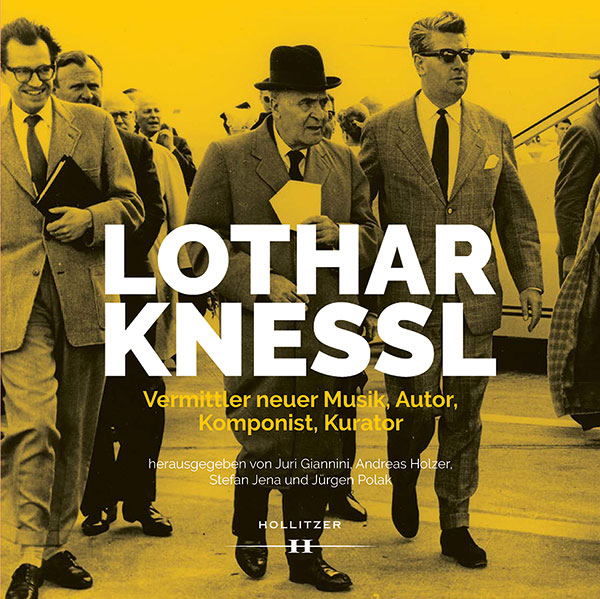Juri Giannini, Andreas Holzer, Stefan Jena, and Jürgen Polak (eds.): Lothar Knessl. Vermittler neuer Musik, Autor, Komponist, Kurator. Hollitzer Verlag, 2018.*

The diverse and multifaceted doings of Lothar Knessl, born in 1927, are alluded to in the subtitle of this book [Intercessor for Contemporary Music, Author, Composer, Curator—trans.] and correspond to this book’s somewhat twofold character: it is meant both as an after-the-fact catalogue of an exhibition presented as part of the festival Wien Modern in 2016 and as a brief overview of the voluminous material that Knessl has made available to the Archive of the mdw’s Department of Musicology and Performance Studies. A brief foreword by the editor is fittingly preceded by two very personal texts written by Bernhard Günther (artistic director of Wien Modern) and Reinhard Kapp (a former mdw professor of music history).
Thereafter, Knessl’s own words take centre stage in the form of documents and accompanying quotations. His music journalism shows him to have been a polemic critic of Vienna’s conservative concert life circa 1960 and an impassioned correspondent regarding performances of newer music from Bartók to Stravinsky and from Cerha to Coltrane. Later on, Knessl followed up on this advocacy in a practical sense during his many years of work at the Vienna State Opera. Further archival materials presented here document the steps involved in Knessl’s work to initiate two contemporary music institutions in Austria: the festival Wien Modern and the Radio Ö1 contemporary music show Studio neuer Musik (which lives on today as Zeit-Ton).
Less known but all the more interesting are Knessl’s activities as a composer, as which he was active from the Second World War into the 1960s and which are documented in the book’s final section. Alongside early composing attempts and pieces for male choir and double quartet written during the period he spent as a prisoner of war, one also catches glimpses of his forays into the most varied genres such as the popular Schlager, the motet, and the cantata, as well as sketch-like experiments with serial techniques.
The success of this book is appropriately twofold: first and foremost, a particularly vivid portrait is drawn of this “doyen of contemporary music” (p. 25), who employed both his pen and his voice to open up new space for new music in central locations of musical life as well as in the mass media, in the process also opening numerous ears to unaccustomed sounds. Additionally, this compilation of diverse archival materials such as photographs, newspaper clippings, and handwritten notes bundles the versatility and liveliness of the discourses and practices associated with Knessl’s activities, thus providing a starting point for deeper study and research in the Department’s archive.
* Volume 1 of the series “From the IMI Archive”

